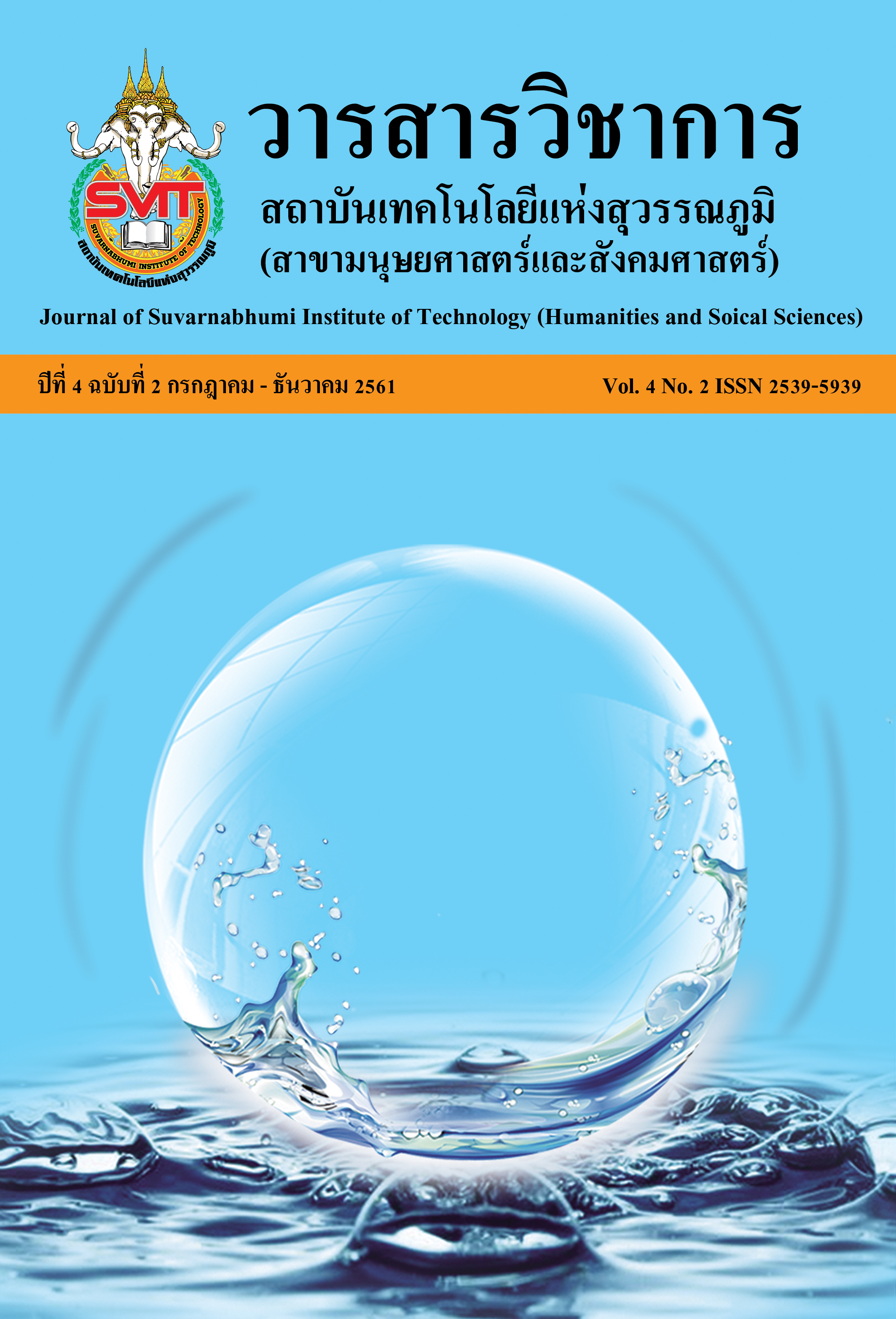MASTER PLAN DEVELOPMENT FOR SUSTAINABLE MANAGEMENT OF COMMUNITY BASED TOURISM IN PHUKET
Keywords:
Master Plan, Community Based Tourism, Sustainable Tourism, PhuketAbstract
This research on developing a master plan for sustainable management of community-based tourism in Phuket aims at examining the potential of communitybased tourism in Phuket, as well as, approaches to its development and management in order to propose a fiveyear tentative master plan (2018-2022) to the Phuket Office of Tourism and Sports. This research employed qualitative research methods in which the main research instruments were focus group interviews, collaborative fieldwork with the Phuket Community Based Tourism Network, and document analysis. The sample consisted of seven groups from the Phuket Community Based Tourism Network as officially proclaimed by the Phuket Provincial Office in 2016. Thematic analysis was used for data analysis. The findings highlighted the outstanding potential of community-based tourism in Phuket which includes the diversity of tourism resources and hospitable community members. Its weaknesses were unreadiness of tourist facilities, inconsistent funding support, and insufficient promotional activities. Its opportunities involved the current governmental tourism policies and the well-built reputation of the tourism industry in Phuket. In contrast, the crucial threats were the changing needs of current tourists and increasing global competition. This research proposed a tentative master plan for sustainable management of community-based tourism in Phuket with seven main strategies and 27 strategic projects for its development and enhancement.
References
กรมส่งเสริมการปกครองส่วนท้องถิ่น. (2550). มาตรฐานการส่งเสริมการท่องเที่ยว. กรุงเทพฯ: สำนักมาตรฐานการบริหารงานองค์กรปกครองส่วนท้องถิ่น กรมส่งเสริมการปกครอง กระทรวงมหาดไทย.
คณะกรรมการนโยบายการท่องเที่ยวแห่งชาติ. (2559). เกณฑ์การพัฒนาการท่องเที่ยวโดยชุมชนของประเทศไทย. กรุงเทพ: คณะกรรมการนโยบายการท่องเที่ยวแห่งชาติ.
ชิรวัฒน์ นิจเนตร. (2542). การวางแผนการศึกษา. ภูเก็ต: สถาบันราชภัฏภูเก็ต.
ตุลา มหาพสุธานนท์. (2545). หลักการจัดการ หลักการบริหาร. กรุงเทพฯ: พ.ศ. พัฒนา.
เทิดชาย ชวยบำรุง. (2552). บทบาทขององค์กรปกครองท้องถิ่นกับการพัฒนาการท่องเที่ยวอย่างยั่งยืนบนฐานแนวคิดเศรษฐกิจพอเพียง. กรุงเทพฯ: สำนักพิมพ์คณะรัฐมนตรีและราชกิจจานุเบกษา.
ปาริฉัตร สิงห์ศักดิ์ตระกูล และพัชรินทร์ เสริมการดี. (2556). การศึกษาศักยภาพและแนวทางการท่องเที่ยวเชิงอนุรักษ์ของชุมชนบ้านทุ่งมะปรัง อำเภอควนโดนและบ้านโตนปาหนัน อำเภอควนกาหลง จังหวัดสตูล. สุทธิปริทัศน์. 27(83): 97–112
พจนา สวนศรี. (2546). คู่มือการจัดการการท่องเที่ยวโดยชุมชน. กรุงเทพฯ: โครงการท่องเที่ยวเพื่อชีวิตและธรรมชาติ.
พิมพ์ลภัส พงศกรรังศิลป์. (2557). การจัดการท่องเที่ยวชุมชนอย่างยั่งยืน: กรณีศึกษาบ้านโคกไคร จังหวัดพังงา. Veridian E-Journal ฉบับภาษาไทย สาขามนุษยศาสตร์ สังคมศาสตร์และศิลปะ. 7(3), ก.ย -ธ.ค: 650-665.
ศูนย์เพื่อการวางแผนการท่องเที่ยวและการแก้ไขปัญหาความยากจนแห่งเอเชีย. (2549). แนวทางการวางแผนการพัฒนาท่องเที่ยวอย่างยั่งยืน = Guidelines on integrated planning for sustainable tourism development / ศูนย์เพื่อการวางแผนการท่องเที่ยวและการแก้ไขปัญหาความยากจนแห่งเชีย. กรุงเทพฯ: ศูนย์เพื่อการวางแผนการท่องเที่ยวและการแก้ไขปัญหาความยากจนแห่งเอเชีย.
สินธุ์ สโรบล. (2551) . การจัดการท่องเที่ยวโดยชุมชน. ประชาคมวิจัย. 57, 15-21.
สุภางค์ จันทวานิช. (2548). วิธีการวิจัยเชิงคุณภาพ พิมพ์ครั้งที่ 13. กรุงเทพฯ: สำนักพิมพ์แห่งจุฬาลงกรณ์มหาวิทยาลัย.
สำนักงานจังหวัดภูเก็ต. (2560). ยุทธศาสตร์การพัฒนาจังหวัดภูเก็ต 4 ปี (พ.ศ. 2558 – 2561). ภูเก็ต:สำนักงานจังหวัดภูเก็ต.
องค์การบริหารการพัฒนาพื้นที่พิเศษเพื่อการท่องเที่ยวอย่างยั่งยืน (องค์การมหาชน). (2560). กุญแจ 3C พิชิตใจนักท่องเที่ยว-ชุมชน. อพท. Travel เที่ยวไปให้ยั่งยืน, 2(12): 8 – 12.
Carmon, N. and Fainstein, S. S. (2013). Policy, Planning, and People Promoting Justice in Urban Development. Pennsylvania: University of Pennsylvania Press.
Dowling, R. K. and Fennel, D. A. (2003). The Context of Ecotourism Policy and Planning. Wallingford: CAB International.
Gartner, W. C. (1996). Tourism Development: Principles, Processes and Policies. New York, USA: John Wiley & Son.
Gartner, W. C. (2004). Rural tourism development in the USA. International Journal of Tourism Research, 6, 151-164
Hall, C. M. (2008). Tourism Planning: Policies, Processes and Relationships (2nd ed.). Harlow: Pearson Education Limited.
Middleton, V., Fyall, A., Margan, M. & Ranchhod, A. (2009). Marketing in Travel and Tourism 4thed. Oxford, UK:Butterworth-Heinemann.
Murphy, P. E. (1985). Tourism. A Community Approach. New York-London: Methuen.
Pinel, D. P. 1999, April. “Create a good fit: A community-based tourism planning model”. In Proceedings of the 1999 International Symposium on Coastal and Marine Tourism Edited by: Miller, M. L., Auyong, J. and Hadley, N. P. Vancouver.
Suansri, P. (2003). Community Based Tourism Handbook. Bangkok: Responsible Ecological Social Tour-REST.
United Nation World Tourism Organisation (UNWTO). (2004). Indicators of Sustainable Development for Tourism Destinations: A Guidebook. Madrid, Spain: World Tourism Organisation.
Downloads
Published
Issue
Section
License
บทความที่ได้รับการตีพิมพ์เป็นลิขสิทธิ์ของวารสาร Sarasas Journal of Humanities and Social Science ข้อความที่ปรากฏในบทความแต่ละเรื่องในวารสารวิชาการเล่มนี้เป็นความคิดเห็นส่วนตัวของผู้เขียนแต่ละท่านไม่เกี่ยวข้องกับสถาบันสารสาสน์เทคโนโลยีแห่งสุวรรณภูมิแต่อย่างใด ความรับผิดชอบองค์ประกอบทั้งหมดของบทความแต่ละเรื่องเป็นของผู้เขียนแต่ละท่าน หากมีความผิดพลาดใดๆ ผู้เขียนแต่ละท่านจะรับผิดชอบบทความของตนเองแต่ผู้เดียว



